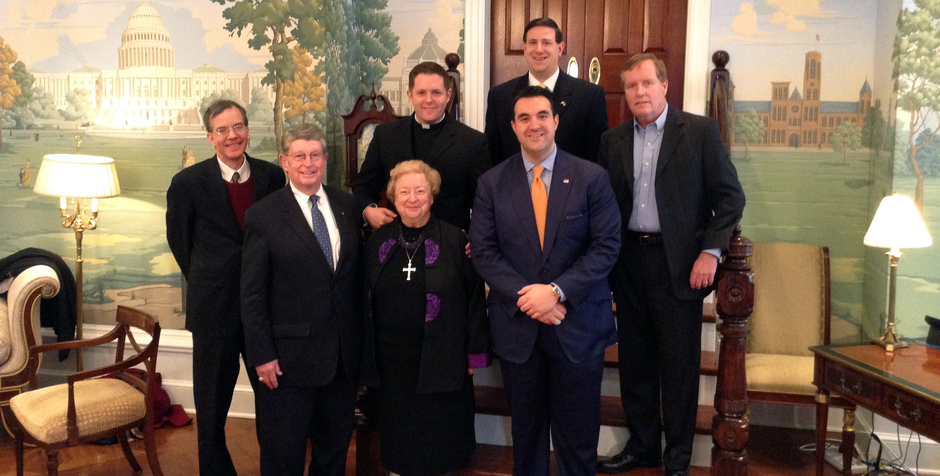Pride and Prejudice? A federal judge's withering view of pro-life activism
The media, typically sympathetic to abortion and slanted against pro-lifers, tends to paint those who stand up against abortion in a rather, let's say, unflattering way. Those who, in turn, draw their general impressions about groups from mainstream media therefore often share that prejudice against pro-lifers. This may be the explanation for the views of federal appeals court Judge Richard Posner, who recently voiced his negative perspective on pro-life picketing and sidewalk counseling.
The particular case before Judge Posner had nothing to do with abortion or sidewalk counseling. In litigation involving a labor dispute in Wisconsin, the U.S. Court of Appeals for the Seventh Circuit sent a case back to the federal district court to figure out if the case had become moot. At issue was a town's ability to prohibit a large, inflated rat balloon (apparently a fairly common union protest device) on a strip of public land next to a street. The union invoked the First Amendment and sued; the town resisted and won in the district court; and the union appealed. But in the meantime, the labor dispute ended and the rat balloon was packed away. So the appeals court, by a 2-1 vote, sent the case back for a determination whether the whole controversy was moot.
The one dissenter was Judge Posner, who felt the union should win its appeal outright. Judge Posner's thoughts about rat balloons are not the point here (though it is notable that he personally photographed a different rat balloon he saw along his work commute, added two photos of that rat to his opinion, and seems to have an affection for the giant rubber rodents). Relevant here is that Judge Posner took the occasion to cast aspersions not just on pro-lifers but on the important free speech victory sidewalk counselors won in the Supreme Court case of McCullen v. Coakley.
The McCullen case involved a sweet, loving grandmother who gently offered help to abortion-bound women outside an abortion business in Massachusetts. Eleanor McCullen [pictured with ACLJ attorneys and others at the ACLJ's DC office in the above photo] brought a First Amendment challenge to a state law that created a "buffer zone," i.e., a no-speech/no-entry zone that prevented Mrs. McCullen from approaching the very women to whom her message was addressed. The ACLJ filed an amicus brief in support of Mrs. McCullen in the Supreme Court, and we were delighted when the Court unanimously ruled in her favor.
Judge Posner appears not to have been delighted. Indeed, he attacks the McCullen decision, even while saying he "must bow" to its authority. Where does Judge Posner go wrong?
First, the judge notes that the Supreme Court said in McCullen, as it has long said over the years, that public sidewalks "have hosted discussions about issues of the day throughout history." "This isn't actually true," Judge Posner objects. "No one wants to be buttonholed on the sidewalk by bearers of 'uncomfortable messages.' If you’re assailed on the sidewalk by an 'uncomfortable message,' you don’t stay to engage in a debate; you flee."
Stop right there.
The Supreme Court did not say anything about wanting to hear the message. Surely, many early Americans did not want to hear that they should stand up to the British and risk their careers and even their lives. Many folks over the intervening centuries were not eager to hear that America should enter a war or leave a war, that they should abandon the practice of slavery, that they not shop at their preferred business because of a labor dispute, that they should support a given political candidate, and so forth.
Moreover, Judge Posner's focus on the message being "uncomfortable" is the exact opposite of free speech rights: restricting speech because of its viewpoint is an especially egregious violation of the First Amendment.
Second, Judge Posner, while conceding that "abortion protesters" are not normally violent, nevertheless describes as "negligible" the contribution pro-lifers' speech makes to the "marketplace in ideas and opinions." But this totally ignores the fact that for the abortion-bound woman, the sidewalk counselor's message can be life-changing, indeed life-saving. And how is the message that abortion hurts women, or kills babies, any less a part of the marketplace of ideas than the message that "Racism is Wrong" or that "Animal Research is Scientific Fraud"?
Third, Judge Posner describes as "virulent," "distress[ing]," and "rude" a "'non-violent six-hour protest'" where pro-life activists in Massachusetts "'chanted, prayed, and sang'" and only "'occasionally erupted into vitriol and shouting,'" according to a Boston Globe article. Show me a protest that lasts six hours with hardly any shouting or "vitriol", featuring prayer, singing, and chanting, with the most gruesome sign being the hands of Jesus (marked by His nail wounds or "stigmata") holding an aborted baby, and I'll show you a remarkably peaceful, polite, law-abiding bunch!
Judge Posner is entitled to his opinions, including his sour view of pro-lifers. But he should be careful not to let his personal bias interfere with the faithful application of the law the next time pro-life sidewalk counselors or picketers show up before him in court. He ought to extend to pro-lifers at least as much courtesy as he gives to a giant, rubberized rodent.
